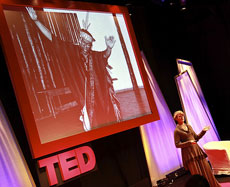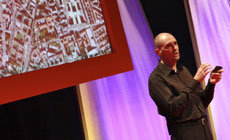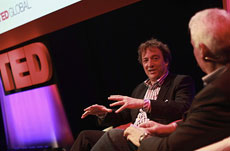 Fields Wicker-Miurin, co-founder of Leaders’ Quest in London, trains business leaders by connecting them to other leaders. Yes, it sounds rather common – but her leaders live in the Amazon forest or are advocates of HIV education in India or collect and display artifacts related to uneasy periods in Chinese history: they are leaders that face the real challenges of our time.
Fields Wicker-Miurin, co-founder of Leaders’ Quest in London, trains business leaders by connecting them to other leaders. Yes, it sounds rather common – but her leaders live in the Amazon forest or are advocates of HIV education in India or collect and display artifacts related to uneasy periods in Chinese history: they are leaders that face the real challenges of our time.
Wicker-Miurin (in the photo at right) was one of the featured speakers on Monday at a TED Salon in London. She spoke forcefully and inspiringly about Benki, a young tribesman from deep in the Amazon, facing the threat of deforestation, which not only has an impact on climate change, but also, much more immediately, on the existence of his people. Becoming a leader very early in life, he recognized that the environment, the animals, the rivers, the air he breathes and his tribe’s existence were in danger. That’s when he took a step out of the Amazon and traveled 3000 km to the Earth Summit in Rio — to tell the world outside about the world inside the forest, and connect the two worlds. He spoke, but he also learned a lot, and brought those learnings home. Almost 20 years have past and the Ashaninkas (Benki’s tribe) have reforested 25% of their territory, created schools, brought satellite Internet to the village, and more.
After describing other profiles from around the world, Wicker-Miurin summarized the seven characteristics of the “new leaders”: they go away from what they know; build bridges and walk across them; have a sense of the great arc of time; know that they depend on others; remember that “it’s not about them, but it starts with them”; and have humility.
The TEDSalon was organized around the release of a special edition of design mind, the magazine published by TEDGlobal partner frog design — who also created the awesome TEDGlobal program guide. design mind is fully devoted to the recent TEDGlobal2009 (the mag, 100 pages of great coverage, interviews, original essays and photos, is available here). Hosted by TED European director Bruno Giussani and by the magazine’s editor-in-chief Sam Martin, the event was attended by 125 people (Flickr photostream) including many of those featured in the magazine, together with TEDsters past and new, speakers and TED Fellows.
 Another speaker was Fabio Sergio, the creative director at frog, who explored the possibilities of using data produced by the human body to educate the human mind. His main proposition goes like this: We live in a world of data. From keeping track of our household expenses to sharing our running data with the community at Nike+: What would happen if we extend this to more areas? He sees four intersecting opportunities: Access to our own data streams and services to accrue and store our bitcrumbs forever; individual and collective aggregations to reveal hidden patterns; well-designed interactive tools of self-reflection to visualize, manipulate, and shape raw data into meaningful information; and social networks that encourage and sustain virtuous behavior by treating it as social currency.
Another speaker was Fabio Sergio, the creative director at frog, who explored the possibilities of using data produced by the human body to educate the human mind. His main proposition goes like this: We live in a world of data. From keeping track of our household expenses to sharing our running data with the community at Nike+: What would happen if we extend this to more areas? He sees four intersecting opportunities: Access to our own data streams and services to accrue and store our bitcrumbs forever; individual and collective aggregations to reveal hidden patterns; well-designed interactive tools of self-reflection to visualize, manipulate, and shape raw data into meaningful information; and social networks that encourage and sustain virtuous behavior by treating it as social currency.
 The evening also featured an interview of Misha Glenny, the underworld investigator (author of “McMafia“) who sat down with Giussani for a follow-up to his remarkable TEDGlobal speech. Glenny discussed very openly, and with genuine humour, his research methods, the encounters with his sources, and some behind-the-scenes episodes. Andreas Raptopoulos, founder of FutureAcoustic, gave an exclusive technology demo of reactive soundscapes. And singer/songwriter Lou Rhodes concluded the program with a stunning “unplugged” live performance.
The evening also featured an interview of Misha Glenny, the underworld investigator (author of “McMafia“) who sat down with Giussani for a follow-up to his remarkable TEDGlobal speech. Glenny discussed very openly, and with genuine humour, his research methods, the encounters with his sources, and some behind-the-scenes episodes. Andreas Raptopoulos, founder of FutureAcoustic, gave an exclusive technology demo of reactive soundscapes. And singer/songwriter Lou Rhodes concluded the program with a stunning “unplugged” live performance.
(Photos: Robert Leslie)
Comments (1)
Pingback: Obsessive Scouting « Jmam29's Blog